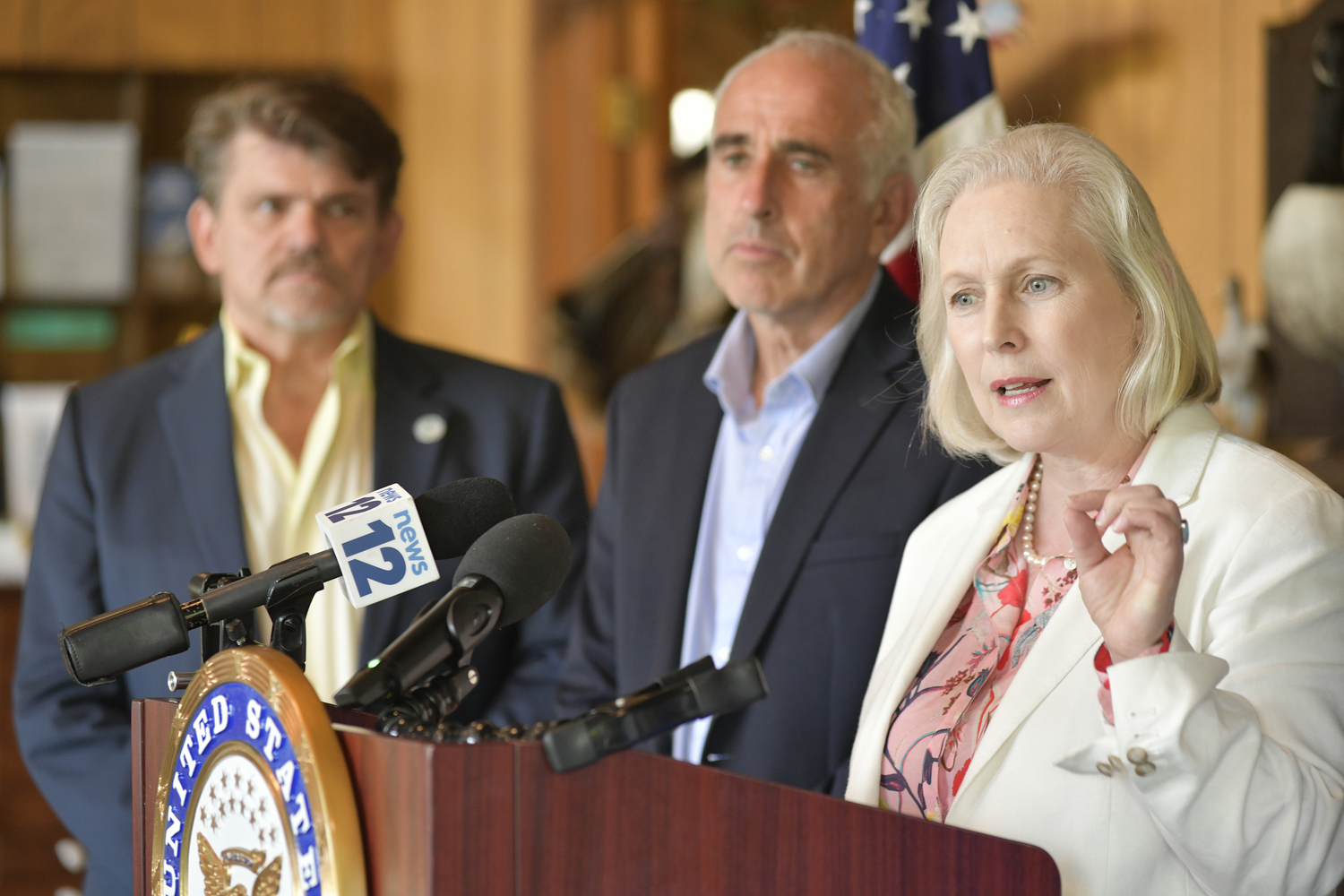
Nothing lasts forever — though there are some notable exceptions: love, according to the poet; sadness, according to the painter; and polyfluoroalkyl chemicals, or PFAS, according to U.S. Senator Kirsten Gillibrand.
She was at the Quogue Wildlife Refuge last Friday, July 28, to announce that she had introduced the Clean Water Standards for PFAS Act of 2023, which sets out to regulate the toxic but widely used “forever chemicals” under the aegis of the Clean Water Act.
Gillibrand’s bill proposes a regulatory rollout that puts new restrictions on various industries that now utilize PFAS in their industrial practices. It sets out to establish federal limits to “help stop the flow of PFAS into our nation’s waterways,” according to a release from the senator’s office, and gives the Environmental Protection Agency leeway to “develop water quality criteria and limits on industrial PFAS discharges into water and water treatment plants.”
The locale for Gillibrand’s announcement was significant, given that, as Southampton Town Supervisor Jay Schneiderman observed, there are areas in and around the Quogue Wildlife Refuge where significant amounts of PFAS remain in the ground. The nature preserve is adjacent to the Francis S. Gabreski Airport, where elevated levels of PFAS were discovered by the New York State Department of Environmental Conservation in 2014. The contamination was pegged to the airport’s use of firefighting foam known to contain PFAS.
These so-called “forever chemicals” break down very slowly in nature and are found in products such as leather clothing, waterproof mascara, nonstick cookware and elsewhere. Potential health impacts include thyroid problems and various cancers.
Gillibrand told reporters she hoped to pass her bill this year and was casting about for bipartisan buy-in, noting that she had worked with Republican Senator Shelly Capito to successfully push through a 2019 bill that told the EPA it had a year from the bill’s enactment “to declare PFAS as hazardous substances eligible for cleanup funds under the EPA Superfund law, and also enable a requirement that polluters undertake or pay for remediation.”
Provisions of that bill were incorporated into the 2019 National Defense Authorization Act signed by former President Trump: The NDAA added PFAS to a list of chemicals covered by the so-called Toxic Release Inventory, a public database and “resource for learning about toxic chemical releases and pollution prevention activities reported by industrial and federal facilities,” according to the EPA.
Gillibrand’s latest PFAS bill would be the first to set federal limits on PFAS and offers a detailed rollout of a new regulatory regime to regulate and monitor the flow of PFAS being released into the groundwater at various industries: Textile mills, electroplating businesses, metal finishing business, landfills, and plastic molding and forming businesses would face these new standards within the next couple of years should Gillibrand’s bill get signed into law. The bill would also study firefighting foam and other industrial uses to determine whether similar restrictions should apply.
Asked whether there was buy-in from any of the Republican U.S. Representatives on Long Island, including 1st District U.S. Representative Nick LaLota, Gillibrand said LaLota would be a perfect co-sponsor.
Adrienne Esposito, the longstanding executive director of Citizens Campaign for the Environment, said the entire Long Island congressional delegation is dealing with PFAS in their midst — declaring it “the biggest water quality challenge” on Long Island.
“It is unacceptable that toxic PFAS chemicals are infiltrating the water supply of communities on Long Island and across the entire nation,” Gillibrand said. Her release noted that dozens of water districts on Long Island have traces of PFAS in the drinking water.
The political climate for getting this sort of legislation signed into law is an improvement over the previous administration and its extreme anti-regulatory posture. “It certainly wasn’t going to pass under Trump,” said Gillibrand.
But regulating PFAS wasn’t much of a priority during the Obama years, either, when the former president famously took no action to regulate PFAS in wide use during a natural-gas fracking push promoted by Obama as a bridge to a cleaner and greener future.
Industry pushback to a new EPA push to study and regulate PFAS is already afoot.
After the EPA issued its first PFAS “strategic roadmap,” in 2021 the American Chemistry Council, the trade association for the U.S. chemical industry, responded by noting that PFAS are in use in cellphones and solar panels and “alternatives are not always available.” The ACC said it supported “science-based regulation of chemicals, including PFAS,” but argued that “all PFAS are not the same, and they should not all be regulated the same way.”
Gillibrand said that any pushback from industry to her bill — 3M and DuPont are big producers of PFAS — could be addressed if the industry as a whole agreed to ban the PFAS, the idea being “that as long as everyone is going to do it, they’ll all do it,” she said.
Southampton Town Councilman Tommy John Schiavoni said the town had already dealt with PFAS issue “at the ground level.” In 2020, working with the Suffolk County Water Authority, nearly 11,000 feet of new water main was installed in East Quogue to connect 115 homes to SCWA water lines, at a cost of $1.9 million.
Those homeowners had been using private wells for their water supply that were found to be contaminated by perfluorooctane sulfonate (PFOS) and perfluorooctanoic acid (PFOA), two of the most common types of PFAS, and the two most associated with firefighting foam.